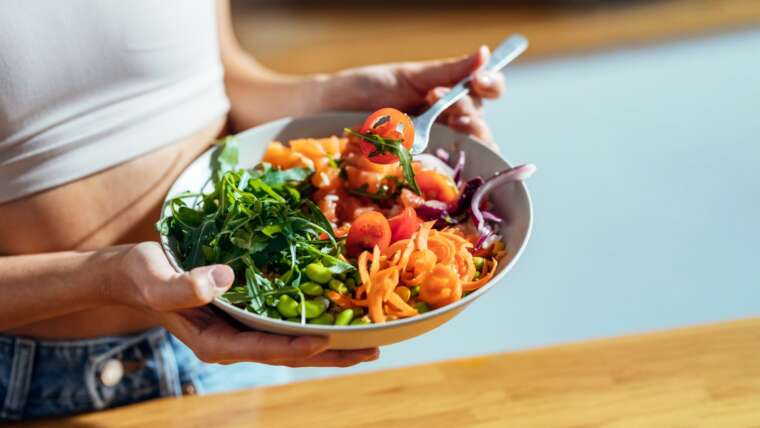Transitioning to a plant-based diet opens the door to a wealth of nutritious and delicious foods that support your overall health and well-being. Vegan health foods are rich in essential vitamins, antioxidants, fiber, and minerals, all working together to nourish your body, improve digestion, and boost energy levels. This guide explores the top vegan health foods you can incorporate into your meals to maintain optimal health and vitality.
1. Leafy Greens
Leafy greens are essential in any vegan diet, packed with vitamins, minerals, and antioxidants that help protect the body from oxidative stress and inflammation. Here are a few nutrient-packed leafy greens to add to your meals:
-
Kale: Loaded with vitamins A, C, and K, kale supports immune function, skin health, and bone strength.
-
Spinach: Rich in iron, calcium, and magnesium, spinach is vital for boosting energy and muscle function.
-
Swiss Chard: High in antioxidants and vitamin K, Swiss chard promotes heart health and reduces inflammation.
Add leafy greens to your smoothies, salads, or stir-fries for a nutrient-rich boost.
2. Berries
Berries are nature’s sweet treats, packed with antioxidants that protect your cells from damage. They also support digestion and heart health, thanks to their high vitamin and fiber content. Top berries to include are:
-
Blueberries: Rich in antioxidants like vitamin C and anthocyanins, blueberries help reduce inflammation and combat aging.
-
Strawberries: High in vitamin C, strawberries support collagen production for healthy skin and wound healing.
-
Raspberries: With their high fiber content, raspberries support digestion and are a great snack or topping for meals.
3. Legumes
Legumes are an excellent source of plant-based protein, fiber, and important vitamins and minerals. They support heart health and help regulate blood sugar levels. Key legumes include:
-
Lentils: Full of protein, iron, and folate, lentils help build muscle and support heart health.
-
Chickpeas: High in fiber and protein, chickpeas aid digestion and are a staple in dishes like hummus and falafel.
-
Black Beans: Rich in protein, fiber, and antioxidants, black beans boost heart health and provide sustained energy.
Legumes can be incorporated into soups, salads, or veggie burgers for versatility in meal planning.
4. Nuts and Seeds
Nuts and seeds are powerhouses of healthy fats, protein, and fiber, benefiting heart health and brain function. Some top picks include:
-
Almonds: Rich in vitamin E and healthy fats, almonds support skin health, reduce inflammation, and help with weight management.
-
Chia Seeds: Packed with omega-3 fatty acids, fiber, and protein, chia seeds promote digestive health and stabilize blood sugar.
-
Flaxseeds: High in omega-3s and fiber, flaxseeds help lower cholesterol and reduce inflammation.
Sprinkle nuts and seeds over salads, smoothies, or oatmeal for a nutrient-packed snack.
5. Whole Grains
Whole grains are vital for a vegan diet, providing essential carbs, fiber, and micronutrients. They support digestion, maintain energy levels, and promote heart health. Key grains to include:
-
Quinoa: A complete protein containing all nine essential amino acids, quinoa is rich in fiber, iron, and magnesium, aiding muscle repair and energy.
-
Oats: Full of fiber, oats help with heart health and promote a feeling of fullness.
-
Brown Rice: A versatile whole grain offering B vitamins, magnesium, and fiber to support metabolism and overall health.
6. Avocados
Avocados are packed with healthy fats, fiber, and vital nutrients like potassium and vitamin E. They aid in nutrient absorption, support heart health, and reduce inflammation. Add them to salads, toast, or smoothies for a creamy nutrient boost.
7. Sweet Potatoes
Sweet potatoes are a rich source of beta-carotene, which converts to vitamin A, crucial for vision, immune health, and skin. They are also high in fiber, supporting digestion and keeping you full longer.
Roast, bake, or mash sweet potatoes as a delicious and nutritious side dish.
8. Tofu and Tempeh
Tofu and tempeh are versatile, high-protein, plant-based foods made from soybeans. Both are rich in calcium, iron, and magnesium, supporting bone health and muscle function. Use tofu in stir-fries, soups, or salads, and try tempeh in sandwiches, grain bowls, or as a stir-fry ingredient.
9. Mushrooms
Mushrooms are a rich source of vitamins, including D and B vitamins, along with selenium. Known for their anti-inflammatory properties, they can also boost your immune system. Use portobello mushrooms as a meat substitute or shiitake mushrooms in soups and stir-fries for an umami flavor.
10. B12-Fortified Foods
Vitamin B12 is crucial for brain health and energy production, but it’s primarily found in animal products. To ensure adequate B12 intake, include fortified foods like:
-
Nutritional Yeast: A cheesy-flavored seasoning often fortified with B12, perfect for sprinkling over pasta or veggies.
-
Fortified Plant Milks: Many plant milks, such as almond, soy, and oat, are fortified with B12.
11. Seaweed
Seaweed is a unique vegan food rich in iodine, omega-3s, and antioxidants, which support thyroid function and heart health. Incorporate seaweed varieties like nori, wakame, and dulse into salads, soups, or vegan sushi for added nutrients.
Read more about Vegan Health and Longevity…
Conclusion
A well-rounded vegan diet, packed with nutrient-dense whole foods, is an excellent way to nourish your body and promote long-term health. By incorporating these vegan health foods into your meals, you can improve digestion, maintain a healthy weight, boost energy, and support your overall wellness.
Whether you’re new to plant-based eating or a seasoned vegan, these foods are key to thriving on your health journey.

